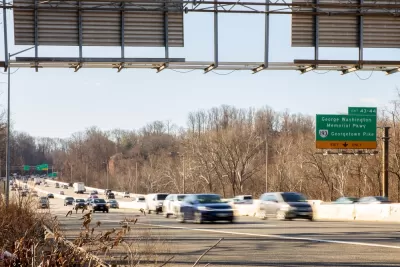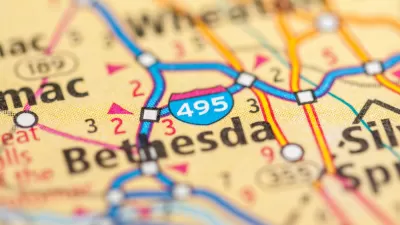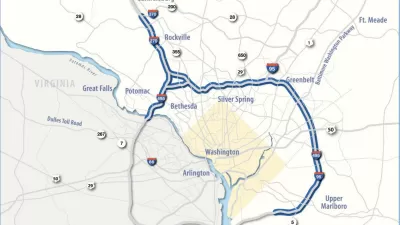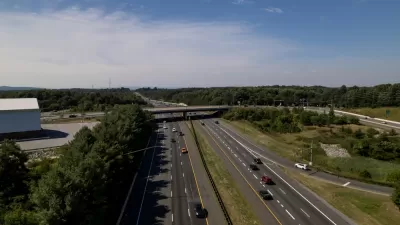In a victory for Governor Larry Hogan, who has championed the project, the Federal Highway Administration is allowing the Beltway expansion project to move ahead.

Maryland Governor Larry Hogan’s controversial $5 billion plan to expand parts of the Beltway and Interstate 270 can move forward after the Federal Highway Administration signed off on the project, reports Ian Duncan in the Washington Post. “Maryland is planning to add two toll lanes to the Beltway in each direction, between the Virginia side of a new and expanded American Legion Bridge and the exit for Old Georgetown Road in Bethesda,” and convert two I-270 lanes to toll lanes. The plan was scaled back in May 2021 in response to strong opposition from some officials and environmental groups.
The project also includes some funding for transit. “The contracting group with which the state intends to partner would provide $300 million for transit in Montgomery County over the life of the project. The state transportation department would build a new facility and provide a fleet of buses, and allocate a further $60 million to design transit projects in the county.”
Nevertheless, transit advocates criticize the project, saying the approval process lacked transparency and “ignored valid concerns from members of the public, and advocates from the environmental and transportation communities.” According to a separate article in Maryland Matters by Danielle E. Gaines, transit advocate Ben Ross cited “possible scientific fraud,” saying that “he found unexplained changes in the traffic models the state used to determine how much time motorists would save by using toll lanes.” The Federal Highway Administration stated they failed to find evidence of any fraud. The project now requires approval of the contract by the state’s Board of Public Works.
FULL STORY: Controversial Hogan plan for Beltway, I-270 toll lanes gets green light

Planetizen Federal Action Tracker
A weekly monitor of how Trump’s orders and actions are impacting planners and planning in America.

Congressman Proposes Bill to Rename DC Metro “Trump Train”
The Make Autorail Great Again Act would withhold federal funding to the system until the Washington Metropolitan Area Transit Authority (WMATA), rebrands as the Washington Metropolitan Authority for Greater Access (WMAGA).

The Simple Legislative Tool Transforming Vacant Downtowns
In California, Michigan and Georgia, an easy win is bringing dollars — and delight — back to city centers.

The States Losing Rural Delivery Rooms at an Alarming Pace
In some states, as few as 9% of rural hospitals still deliver babies. As a result, rising pre-term births, no adequate pre-term care and "harrowing" close calls are a growing reality.

The Small South Asian Republic Going all in on EVs
Thanks to one simple policy change less than five years ago, 65% of new cars in this Himalayan country are now electric.

DC Backpedals on Bike Lane Protection, Swaps Barriers for Paint
Citing aesthetic concerns, the city is removing the concrete barriers and flexposts that once separated Arizona Avenue cyclists from motor vehicles.
Urban Design for Planners 1: Software Tools
This six-course series explores essential urban design concepts using open source software and equips planners with the tools they need to participate fully in the urban design process.
Planning for Universal Design
Learn the tools for implementing Universal Design in planning regulations.
Smith Gee Studio
City of Charlotte
City of Camden Redevelopment Agency
City of Astoria
Transportation Research & Education Center (TREC) at Portland State University
US High Speed Rail Association
City of Camden Redevelopment Agency
Municipality of Princeton (NJ)





























